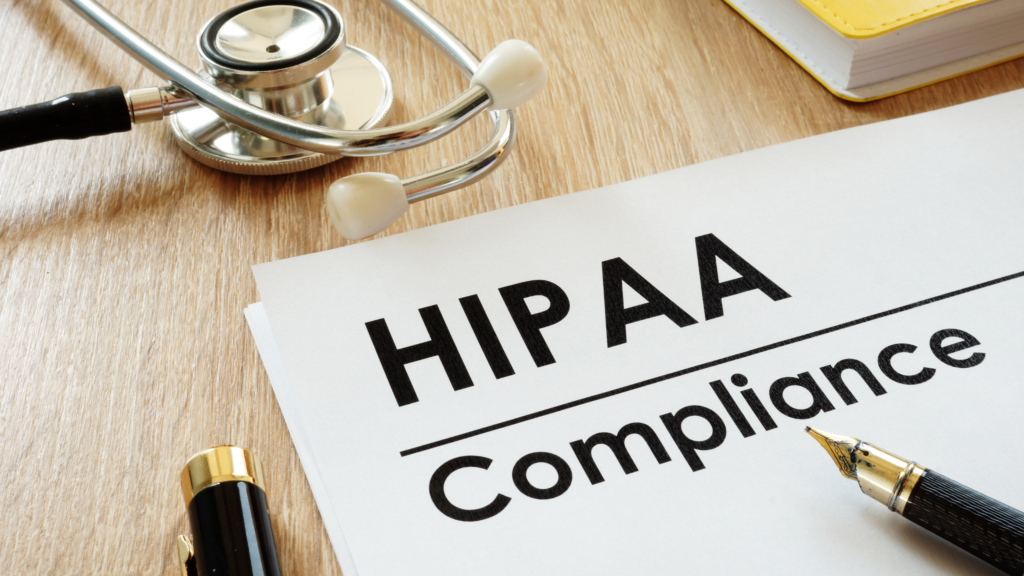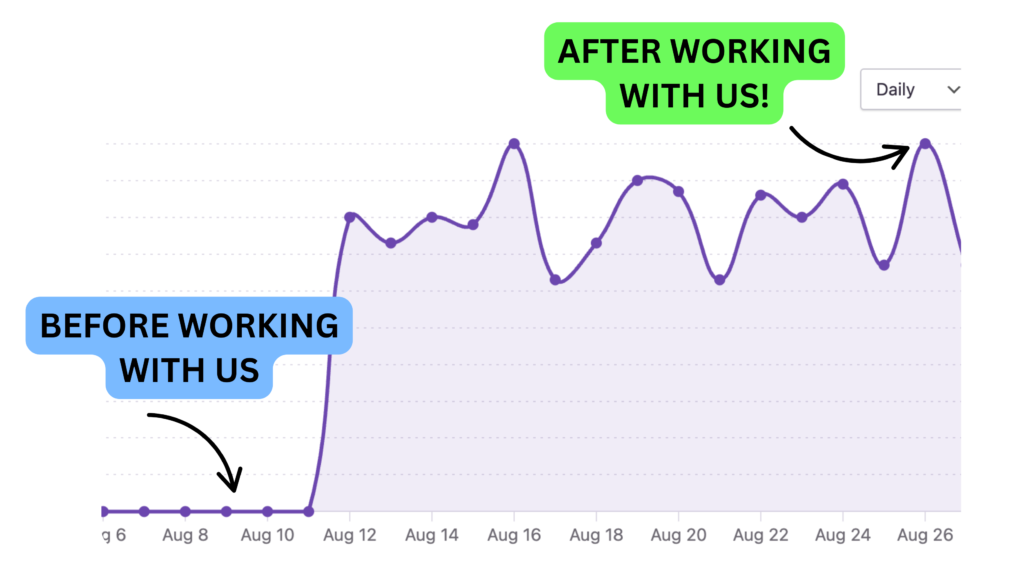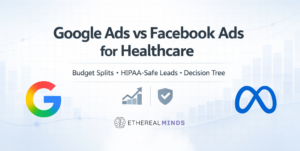Marketing in healthcare is exciting, but it comes with unique responsibilities. Unlike other industries, promoting a med spa, a chiropractor practice, or a clinical trial means playing by HIPAA rules. And if you get compliance wrong, the risks are serious: fines, lawsuits, and damaged trust.
Over the years working with different healthcare clients, I’ve learned that many don’t even realize when HIPAA compliance in healthcare marketing applies to them, and when it doesn’t. So, in this guide, I’ll walk you through how HIPAA compliance fits into healthcare marketing, the biggest risks, real world examples, and practical steps to stay safe while growing your practice.
What HIPAA Compliance Means in Marketing
The basics of HIPAA and PHI (Protected Health Information)
At its core, HIPAA exists to protect PHI (Protected Health Information). This includes anything that can identify a patient, such as names, emails, phone numbers, medical conditions, or treatments.
HIPAA compliance in healthcare marketing comes into play whenever campaigns involve collecting, storing, or using PHI. That means everything from contact forms on your website to email campaigns could become a compliance issue if PHI isn’t handled correctly.
Covered entities vs. business associates in marketing
Covered entities include healthcare providers, insurers, and related organizations. Business associates are vendors or partners that process PHI on their behalf. In marketing, that usually means software platforms like CRMs, email tools, or form providers that directly handle patient data.
Important note: The right platforms sign BBAs. For example, some HIPAA compliant CRMs or form builders will offer BAAs to ensure PHI is protected.
Why healthcare marketing is different from other industries
Unlike retail or e-commerce, you can’t just upload a list of clients and start blasting out campaigns. Every step has to respect patient privacy. Even something as simple as sharing a testimonial requires extra care.
Common HIPAA Risks in Healthcare Marketing
Collecting leads and patient information
When you’re generating leads, especially for sensitive services like clinical trials or mental health practices, the tools you use must be HIPAA compliant. I’ve seen cases where forms weren’t secure, and that’s a huge risk. Platforms designed for compliance ensure data is encrypted and stored safely.
Using testimonials, reviews, and before/after photos
A med spa we worked with wanted to highlight amazing client transformations. That’s great for marketing, but we had to make sure every testimonial was backed by a signed consent form. Even something as innocent as posting a before and after photo without consent could violate HIPAA.
Email marketing, CRMs, and communication tools
Email is a powerful marketing channel, but it’s also a common area for violations. Regular platforms aren’t always HIPAA compliant. The safer approach is to choose tools that specifically handle PHI and offer BAAs.
Social media and content publishing risks
Posting on Facebook, Instagram, or TikTok is fine, until you accidentally include PHI. Something as small as a patient’s name in a post can be a compliance issue. Always double check content before it goes live.
Real World Examples of HIPAA in Marketing
Med spas and clinics. Lower PHI risks but still compliance concerns
For med spas, we often focus on bringing in traffic and new clients. Since we don’t touch patient records, HIPAA isn’t as strict. But we still have to be careful: no names in testimonials without consent, no photos without permission.
Clinical trials and research institutes. High risk scenarios
On the other hand, I’ve also worked with research groups recruiting participants for clinical trials. In this case, PHI is collected directly through lead forms. Everything from the form setup to how leads are stored has to be HIPAA compliant. That means using secure platforms that encrypt data and sign BAAs.
How agencies can protect healthcare clients
Agencies should guide clients toward HIPAA compliant platforms, create secure workflows, and know where risks might appear. It’s not about handling PHI ourselves, it’s about making sure the systems we set up protect it.
How to Make Your Healthcare Marketing HIPAA Compliant
Choosing HIPAA compliant platforms (forms, email, CRMs)
This is step one. If PHI is involved, only use platforms that offer HIPAA compliance and a BAA. That way, your data handling is covered from a security standpoint.
Getting patient consent the right way
Never publish reviews, testimonials, or photos without written consent. A signed form isn’t just paperwork, it’s protection for your practice.
Training your team and marketing partners
Your staff and partners need to know what’s safe and what’s risky. A simple mistake, like emailing a patient’s condition to the wrong person, can create a violation. Training prevents these slip ups.
Why working with specialized healthcare agencies matters
I’ve seen too many practices hire generalist agencies who don’t understand HIPAA. That’s dangerous. A specialized healthcare agency knows when compliance matters, and when it doesn’t. This saves clients from unnecessary risks and ensures marketing campaigns run smoothly.
Best Practices and HIPAA Compliance Checklist
What healthcare marketers can do today
- Audit your current marketing platforms.
- Confirm whether PHI is being collected.
- If yes, ensure those tools are HIPAA compliant.
Red flags when working with a marketing agency
- They don’t ask about HIPAA at all.
- They use non compliant tools for lead generation.
- They don’t provide clear consent processes for testimonials.
Quick compliance checklist for healthcare practices
- ✅ Use HIPAA compliant forms and CRMs if collecting PHI.
- ✅ Get written consent for testimonials/photos.
- ✅ Train your staff on compliance basics.
- ✅ Double check social media posts for PHI.
- ✅ Partner with agencies that understand healthcare compliance.
FAQs on HIPAA and Healthcare Marketing
Sharing patient info without consent, using non secure tools for PHI, or publishing testimonials/photos without written approval.
Yes. Posting any PHI, even accidentally, can violate HIPAA.
Yes, but only with signed patient consent.
By avoiding PHI in campaigns, securing consent for testimonials, and double checking social media content.
Marketing Success Without Compliance Risks
HIPAA compliance in healthcare marketing doesn’t have to be scary. The truth is, compliance really depends on the type of client and campaign. For some, like med spas, the risks are smaller. For others, like clinical trials, every lead form and email matters.
The key is to use HIPAA compliant platforms when PHI is involved, get proper patient consent, and work with agencies who know the rules. That way, your healthcare practice can enjoy the benefits of digital marketing, without the risks of costly violations.
| Platform | Use Case | HIPAA Compliance Notes | BAA Availability |
| JotForm (Jotform Enterprise) | Secure forms & surveys | Ideal for collecting patient leads, intake forms, and clinical trial applications. Data is encrypted and stored securely. | ✅ Yes, JotForm offers a BAA on enterprise plans. |
| Google Workspace | Email, docs, forms, storage | Great for internal collaboration and email. Must configure properly (e.g., disabling certain non compliant features like Google Photos). | ✅ Yes, available with paid Google Workspace accounts. |
| Microsoft 365 | Email, docs, cloud storage | A strong alternative to Google Workspace with HIPAA configurations available. | ✅ Yes, Microsoft signs BAAs for covered services. |
| Salesforce Health Cloud | CRM & patient engagement | Designed for healthcare organizations, with HIPAA features built in. | ✅ Yes, Salesforce offers BAAs. |









